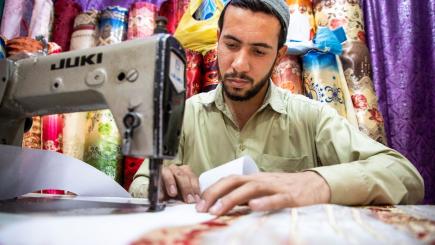
Trained mechanics on apprenticeship after 6-month vocational training
©Caritas
The project in brief
Implemented by
Caritas Uganda and Caritas Arua
Country
Bidibidi Refugee settlement, Yumbe District, west Nile region, Uganda.
Duration
September 2016 - 2021
Description
This project presents the effectiveness of vocational and community based skills training in solving unemployment for refugees and host communities in Bidibidi. Caritas Uganda is providing quality vocational skills training to equip the youths with knowledge and skills required in the job market with the generous financial support from Caritas Denmark, Caritas Internationalis and Caritas Norway. Youth who are not passionate in agriculture are offered non-agricultural skills through a 6-month vocational training for alternative income generation, and a 3-month community-based skills training for adolescents and women who are not qualified to go for a 6-month’s training. The training is very useful, it empowers the youth, Adolescents and women to find employment opportunities and thus sustain their livelihoods.
1) Vocational skills training:
Providing Vocational skills training for both Refugee and host community youth (male, and female) in skills of their choices (carpentry and joinery, brick laying, saloon and hair dressing, tailoring among others). The training is aimed at turning around the situation of unemployment among the youth and empowers the unskilled youth with a better future and career prospects. The wide range of courses enable the student to acquire skills to be job creators other than job seekers within and outside the refugee settlements. The youths are provided with start-up kit after completing the training to enable them execute their skills accordingly.
2) Apprenticeship:
The youth who have completed the 6-months vocational training are taken for one- month apprenticeships in order to prepare them to compete for jobs. The trainees are attached to different institutions, workshops and existing entrepreneurs for mentoring. Caritas also link the students who have completed both the training and apprenticeships/internship to available jobs with other partners and conducts follow ups to establish the numbers of people with businesses. Caritas found apprenticeship to be one of the most successful and cost effective vocational skills training between 2016 to date. A total of 400 youths and women have been trained so far and 25% of them have established enterprises of the choices.
3) Community based skills training:
Caritas Uganda also provides a 3 –month’s community based skills training for women, girls and elderly who are not qualified and are left out from the vocational skills training which increases efforts for inclusion. These beneficiaries (refugees and host communities are also given start-up kits to prepare them to start their own businesses). Other stakeholders such as local government, refugee welfare committees, committee extension workers and office of the prime minister are involved during the selection of beneficiaries.

Youth supported by Caritas are building a house for persons with special needs in CRS Program as part of their apprenticeship.
© Caritas
Project aims
GOAL: to improve livelihood, and resilience of South Sudanese refugees and host communities in Zone 2 of Bidibidi refugee settlement and surrounding host communities.
OBJECTIVE: to reinforce the enabling environment to support the resilient livelihoods.
Resources used
The project is being funded by Caritas Denmark working through the Pesitho company. Caritas is following the government frame policies such as Uganda Refugee Act 2006, the Refugee and Host community population Empowerment (ReHOPe) strategy and the district development plan to implement the projects. The students are taken to the existing government vocational institutions within the west region.
Partners
- Caritas Uganda
- Local government structures and Refugee leadership
- Caritas Denmark
- Office of the Prime Minister at the settlement level.
Challenges and how they were overcome
Challenges
- High cost of school fees.
- Finding the right team (human resource), insufficient team skills.
- Miscommunication that created conflicting views.
How they were overcome
- Caritas Uganda trained the local Caritas staff with support from Caritas Denmark.
- The current leadership inspired the team to work.
- Caritas analysed and brought on board different stakeholders such as the local leaders to support the project.
- The local government structure was followed from the highest to the lowest level.

A 18 year old South Sudanese girl who dropped out from school is making money from skills gained in community based training in Zone 2 of Bidibidi Refugee settlement.
©Caritas
Results of the Good Practice
- 25% of the youths trained from 2016 to date have diversified their income base due to an enhanced livelihoods.
- 25% of the 400 youths have started their own businesses and are making money.
- 30% of the youth supported are able to support their households to eat at least 3 meals a day.
- The refugee leaders, local government leaders and Office of the Prime Minister at the field level are involved in the selection of the beneficiaries.
- The good practice on vocational and community based training broaden the support for refugees and host communities and also the Refugees will use the skills when they go back to south Sudan.
- The needs for the training were identified by Caritas, both Refugees and host communities were able to go for courses of their choices. The skills is benefiting the beneficiaries and their entire households.
- The beneficiaries include male and female, persons with disabilities, women, youth and elderly, refugees and host communities.
- Caritas Uganda and Caritas Arua were able to scale up the vocational and community based skills training in zone 3 of Bidibidi settlement and also extending to Palorinya settlement. A total of 190 beneficiaries (140 community based and 50 vocational students) have been trained in 2018/2019. Caritas plans to train 85 more youths in Polorinya settlement in 2020.
Next steps
The project is continuing and it has been extended to zone 3 of Bidibidi Refugee settlement and Palorinya refugee settlement.


